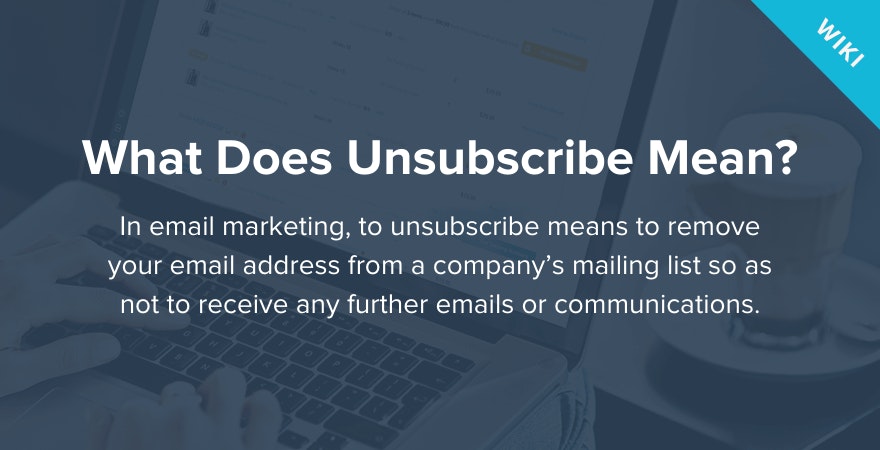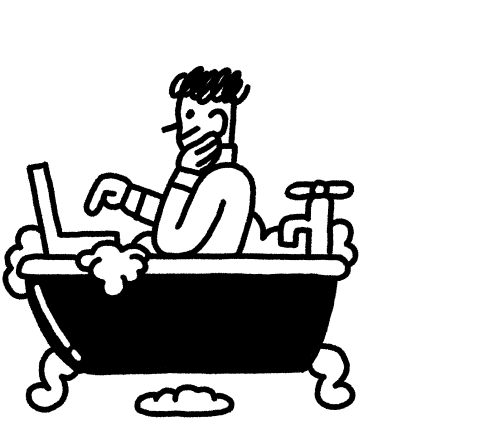
Unsubscribe
注销是什么意思?
In email marketing, to unsubscribe means to remove your email address from a company’s mailing list so as not to receive any further emails or communications. Every email campaign must include an unsubscribe link to provide subscribers an option to remove themselves at any time.
Campaign Monitor consider anaverage unsubscribe rate of .17% to be goodfor their business!

Start your 14-day free trial on Shopify today!
Start Free TrialWhat is an Unsubscribe Rate?
The unsubscribe rate is a metric that measures the percentage of people who opt out from an email list. An unsubscribe rate that is less than 1% is considered within industry standard.
The unsubscribe rate percentage is calculated by dividing the number of people who unsubscribed by the number of emails delivered times hundred (Unsubscribed number/Emails delivered x 100 = Unsubscribed rate %).
What is a Good Unsubscribe Rate?
The average unsubscribe rate will largely depend on the niche you are in, but anything below 0.5% is considered good, while 0.5-1% is regarded as reasonable but could be improved. Campaign Monitor consider anaverage unsubscribe rate of .17% to be goodfor their business!
A high unsubscribe rate can indicate various problems – you might be targeting the wrong people, the quality of your email content might be poor, your emails might not work on mobile devices or they might be sent at the wrong times.There are numerousemail marketing techniquesyou can use to lower the number of unsubscribes, but a fluctuating or steadily increasing unsubscribe rate should always be taken as a red flag.
What Happens When Someone Clicks Unsubscribe?
To unsubscribe from an email list, a recipient has to click on a unique unsubscribe link at the bottom of an email that is immediately recorded in the sender’s email system. The subscriber’s status is then automatically changed from active to unsubscribed and he appears as unsubscribed in the campaign report.
Tips to Reduce Your Unsubscribe Rate
The unsubscribe rate is a critical statistic to track during everyemail campaign, as it helps you to measure the success and gauge consumer interest into your products and promotions. It is also one of the most unpleasant metrics that marketers need to deal with, but there areways you can improve it:
- Keep your mailing list updated:ensure you’re only communicating with people who agreed to receive emails from you and continuously top up your list with fresh leads. New subscribers are typically more engaged and more eager to indulge in special offers.
- A/B test email frequency and time:it is crucial to form certain habits that become routine by regularly sending your emails at certain times. A/B tests can help you optimize the frequency, content and style of your emails to achieve the best performance.
- Create value:one spammy email can cause a huge spike in your unsubscribe rates and damage your brand. Always aim to provide valuable, unique content to your subscribers that will earn their trust and respect, and the sales will follow.
- Optimize for mobile:as email opens on mobile are skyrocketing, taking mobile devices into consideration early in the design process will help you reduce the unsubscribe rate and tap into a huge trend that shows no signs of diminishing.
- Keep the unsubscribe link visible:subscribers should always have an option to opt out from a mailing list if they no longer wish to receive emails from you. By making the unsubscribe link visible and accessible, you’ll avoid spam complaints and maintain a positive image of your brand. It’s not unusual for subscribers to come back after some time, so let them go on good terms.
Want to Learn More?
- Email Marketing 101: A Cheat Sheet for Email Marketing That Works
- Email Marketing Strategies to Turn More Prospects Into Paying Customers
- The Complete Guide To Marketing Channels
- 6 Best Email Marketing Examples to Convert Online Customers
Is there anything else you’d like to know more about and wish was included in this article? Let us know!